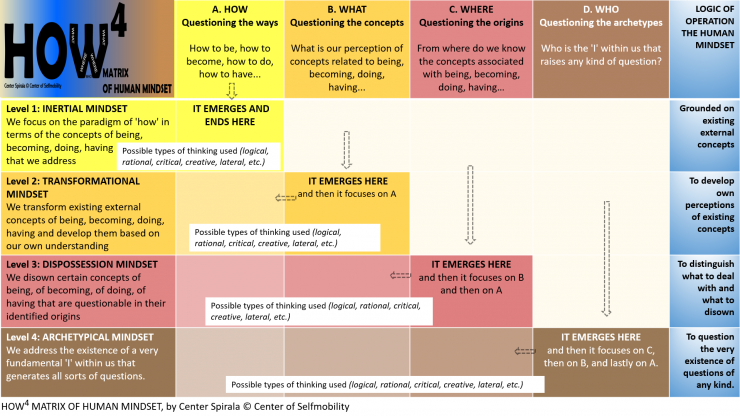HOW4 Matrix of Human Mindset
 Contextual background
Contextual background
The way we ask questions in life says a lot about how we think and, ultimately, about ourselves. Last decades we have been facing with the dominant doctrine of know-how philosophy. In a way that our lives are based on HOW-Questions about how to be, how to do, how to achieve, how to become this or that within the wider society. This kind of dominant 'How-Questioning' that we use refers to the developmental aspects of efficiency, productivity and promoting development (of someone or something) that underpin the growth development paradigm. How-Questioning is otherwise necessary in our lives, especially given the increasingly fast pace of our modern lifestyles. However, the initial awkwardness of this questioning is that all categories of how (whether it's how to get more money, how to become wiser or more emotionally intelligent, or something else) are put on the same conceptual logic (based on the linear development thinking logic of how to get from undesired point A to desired point B), which often doesn't work or hardly works at all. Moreover, what is more problematic and challenging about this first level of HOW-Questioning is that it is often not followed up by further 'W-Questioning' (related to questions of what, why, when, where, who). Simply put, it seems very unusual to pursue, for example, personal or professional success without first gaining an understanding of 'what' a success, either one or another, means to us or 'why' is important to us.
HOW4 Matrix of Human Mindset highlights that HOW-questioning needs to be put aside until the answers to W-Questioning are not sufficiently found. Questions about 'WHAT' represent the second level of the questioning matrix of thinking. Finding the answers to this WHAT questions (on outlined issues about someone or something) is sometimes sufficient and no further and more elementary questions are needed. It means that after ‘what’ answers we approach to how-questions and try to answer on them.
However, in such a case of the WHAT level, even if we were satisfied with the questions asked, it would mean that we are still trapped in mind frames that have been offered to us, willingly or unwillingly, from the outside.
The next, third level of WHERE Questioning needs to take place to meet the challenge of how to mentally escape from the recipes for success, satisfaction, happiness, wisdom, etc. offered from the outside. When questions refer to finding out when a particular idea about the need to achieve something or become this or that came to us, while 'where questions' try to answer the question of where a particular idea about something came from. With such 'where' questions we slowly escape the existing mind frames in the form of externally offered truths, recipes and patterns that have been unconsciously placed in our minds. Our questioning process is very likely to stop at this level when it comes to this kind of W-Questioning.
However, there is another, fourth level of WHO-Questioning waiting for us and needed here and there in our lives. It is about 'who' within our personality structure (regardless of how we personally perceive ourselves) initiates any kind of question about the need to be or to become or to have anything, and similar. This fourth level of WHO-Questioning is necessary if we are to understand how any kind of question arises in the first place. However, because of its deep archetypal level, this level of questioning is often overlooked because it is either not recognised or treated as not sufficiently useful.
The HOW4 Matrix emphasises the need to address the HOW-Questioning at the end after we have arrived at satisfactory answers to the W questioning. More importantly, and more challenging, the model precisely addresses the specificity of all four levels of questioning and gives central attention to activating and triggering insightful thinking in our mind, depending on the question we are addressing. Because the way we ask questions and search for answers (in)directly reveals how our thinking process works.
For more information about the Matrix, please contact us using the form below.